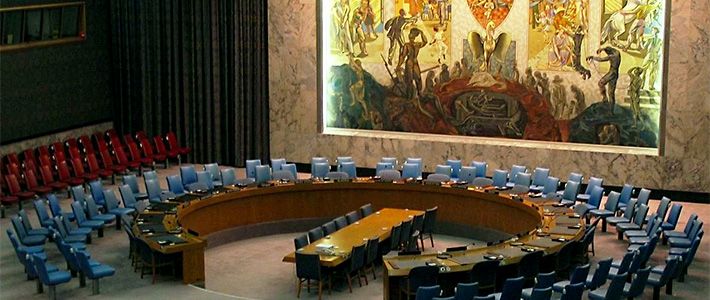
UN Security Council Reform: A Challenge for Japanese Diplomacy
Politics Society Culture- English
- 日本語
- 简体字
- 繁體字
- Français
- Español
- العربية
- Русский
The years 2016 and 2017 promise to be special ones for Japanese diplomacy. During this period Japan is serving as a nonpermanent member of the United Nations Security Council. This gives us a chance to take another look at the situation in this organization and at the way impactful decisions are made in the present-day world.
Unchanged Permanent Members
Somewhat ironically, Japan's UNSC membership coincides with its hosting this year of the Ise-Shima summit of the Group of Seven nations. In the G7 club of major developed countries, everyone is equal. Decisions are made after complex consultations, and there are no first- and second-rate nations (although, as happened in the case of Russia after the start of the Ukrainian crisis, a country can find itself left out of this well-adjusted mechanism).
The situation in the Security Council is totally different. The functions of the council’s permanent membership are still assigned to those countries that established the organization soon after World War II. Those countries alone can use their veto power to influence the council’s most important decisions, thus turning the voting procedure into a mere conventionality. Despite their influence, though, the composition of the permanent member states hardly reflects postwar reality.
For several decades, the place of continental China was occupied by the government of the Republic of China (Taiwan), not the government of the People’s Republic of China in Beijing.(*1) And the place of the Soviet Union, which disappeared from the world’s political map, was taken by the Russian Federation in 1992 by a collective decision of the former Soviet republics, which was also supported by the United Nations.
This decision could have been very different, though. After the Soviet Union collapsed, the president of Kazakhstan, Nursultan Nazarbaev, proposed that the place in the UN Security Council be assigned to the newly established Commonwealth of Independent States (CIS) rather than transferred to one of the former republics. This fact shows that even the unchanging composition of permanent members is just a circumstance of history.
Not Responding to Change
The mechanism of vetoing decisions made by the UN Security Council and singling out special members is no more than a remnant of history. It does not take into account the appearance of new points of influence in the world or changes in the structure of international relations in the postwar era. Rather than creating real checks and balances, it strengthens the imbalance.
Questions abound. France undoubtedly remains an influential European nation, but is Germany less influential? What about the council’s unwillingness to notice the creation of the European Union, which exhibits an aligned foreign policy strategy? We cannot deny the influence of China, of course, but nor can we contest the weight of Japan and India in Asia. And we cannot help but notice that there are other influential countries besides the United States in the Americas, such as Canada, Mexico, and Brazil. Should we provide a permanent place or the right to veto in the UN Security Council to all of these countries? Or should we look for a new mechanism of interaction?
During the next two years, the place closest to the representative of Japan in the UN Security Council will be occupied by a representative from Ukraine. Both countries face a similar issue: the desire to restore their territorial integrity. But the role of the United Nations in the resolution of similar problems is limited to holding futile meetings. For real results, nations must continue to rely on bilateral negotiations or a relatively efficient international mechanism.
A Serious Challenge for Japanese Diplomacy
In 2016 Japan would like to find a solution to the thorny question of the Northern Territories. But this depends on the possibility of holding a summit between Prime Minister Abe Shinzō and President Vladimir Putin—not to mention hoping they can reach some kind of compromise. This year Ukraine hopes to regain sovereign power over Donbass, but this depends on the efficiency of intermediaries in the Minsk group and meetings of the so-called Normandy format, which brings together the leaders of Russia, Germany, France, and Ukraine.
The UN Security Council must be reformed so that issues that cannot easily be solved at the bilateral level can be settled within the framework of the United Nations. After all, not only the permanent members but all countries should be equal before the law, shouldn’t they?
Japan is sitting in the UN Security Council for the eleventh time. Each time the nation takes this position, there is mounting recognition of the need for serious reform of the body and for updates to international laws. This is a task for the whole international community, of course, but it is also a serious challenge for Japanese diplomacy.
(Originally written in Russian and published on February 4, 2016. Banner photo: A conference hall given to the UN Security Council by Norway. The phoenix rising from ashes symbolizes the rebirth of the world after World War II. Photo provided by Bernd Untiedt.)(*1) ^ From 1945 to 1971 the Republic of China (Taiwan) was a permanent member of the UN Security Council, but after a visit by US President Richard Nixon to Beijing and the warming of relations between the United States and mainland China, the PRC was admitted to the United Nations and the UN Security Council instead of the ROC.
United Nations Japan Russia Prime Minister Abe Ukraine nonpermanent member of the United Nations Security Council permanent member of the United Nations Security Council Ise-Shima Summit President Putin